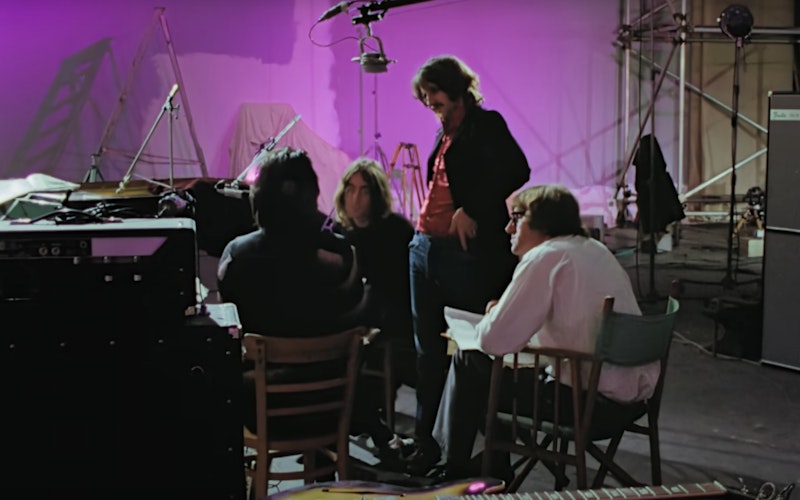
TV
Revelation in The Beatles: Get Back
Early in the expansive, fly-on-the-wall "documentary about a documentary," The Beatles: Get Back, we witness Paul McCartney playing his Hofner bass like a rhythm guitar, circling an idea like a moth on a lamppost. He is killing time, waiting for John Lennon to arrive at Twickenham Studios where the band has ensconced themselves to write, rehearse, and possibly record a new album and prepare for a surprise live concert. At the ripe old age of 27, McCartney is frustrated. He's not furious, mind you. He doesn't even seem mad. But the man is clearly frustrated. What is the band doing? Why are they doing it? Who are they? What does the future hold?
Lennon, however, has an entirely different kind of energy going on. He is similarly unsure about what they are doing, but he seems more interested in deflating the balloon than flying it. Harrison, who was just 25, is bursting with ideas for songs about purpose and meaning. Ringo (29, like Lennon) is tired. He's happy to keep things moving, but not much more. But McCartney is like a pipe bomb set to blow. As he riffs on his bass, the germ of a song starts to sprout, with one of the very few recognizable phrases being "Get back."
Who was he telling to “get back”? For those of us who have only ever had the finished, gloriously impressionistic song in our heads, it’s a revelation to consider that maybe that first creative spark was inspired by Paul’s missing musical brother. Perhaps he wanted John to get back into that chair next to him—where he once belonged. Maybe he was singing to himself—preaching over himself—that he needed to reconnect with his own original passion and vision. Maybe he was sneering at the management, record company, filmmakers, and other hangers-on who hovered around the band, offering their constant (and often ridiculous) opinions about what they should do next. Whatever it was that sparked the song, it's clear that George and Ringo recognize something special is happening. They eventually slide into position and do their best to help coax the nascent tune into the world. When Lennon finally shows up, you can sense that even he is impressed.
For many years, fans have been sold a particular set of myths about the end of The Beatles and how the events leading up to the creation of what would be their final album, Let It Be, contributed to that eventuality. The original documentary, made by Michael Lindsay-Hogg and titled Let It Be, painted a picture of constant turmoil, ego conflicts, and plenty of Yoko Ono. Through newly developed technology and a willingness to spend years painstakingly restoring 60 hours of film footage and over 150 hours of audio to reveal sights, sounds, truths, and complications, director Peter Jackson and his team provide a more accurate picture with The Beatles: Get Back, which is now on Disney Plus. Thus is the nature of any good apocalypse—to show that which was hidden. And while John, Paul, George, and Ringo may fall short on the messianic scale (one they never wanted anything to do with, by the way), it is astonishing to see how fun the band’s coda seems to have been.
What is the band doing? Why are they doing it? Who are they? What does the future hold?
In the final book of the Bible, the Apostle John relays an apocalyptic vision of The End that is rooted in The Beginning: a new heaven and a new earth. In Revelation 21, he connects this unfolding vision with human suffering, promising that God will wipe away every tear from our eyes. There will be no more death or mourning or crying or pain because all of that will have passed away. After this promise, Jesus proclaims, "I am making everything new! . . . Write this down, for these words are trustworthy and true.”
The hunger for things to be made new—to get back to where we once belonged—is universal. We feel it as we encounter injustice. We long for it when friends and family leave us. Before it became the classic we all know, “Get Back” contemplated immigration, purpose, the counterculture, and who knows what else—all with the common refrain that, like the prodigals we are, at some point we need to get back to where we once belonged.
Although The Beatles: Get Back documents the creation of what would end up being the band’s final album (Let It Be wasn’t released until after the band broke up), the experience of reconnecting at their own studio, jamming in a room for hours on end, and playing an approximation of a concert together on the roof of their building seems to have sparked the creation of what would be their actual, final work together: Abbey Road, which was recorded later but released prior to Let It Be. Now I can see and more fully appreciate the profoundly spiritual statement that Abbey Road was. Although the entire project is shot through with pangs of desire for reconciliation and peace, the final suite—"Golden Slumbers," "Carry That Weight," and "The End"—put a breathtaking bit of soulful punctuation on a remarkably short, yet productive, career. I wonder if the band would have gotten to Abbey Road without the self-imposed frustration documented on Get Back. And I wonder if there would have been any way for the four band members to realize their full potential if this season of The Beatles was not given closure.
As they sang in such lovely harmony on their final track, “The End”: “And in the end, the love you take is equal to the love you make.” Somehow I think the Apostle John—who testified that “God is love. Whoever lives in love lives in God, and God in them”—would have sung along.
Topics: TV